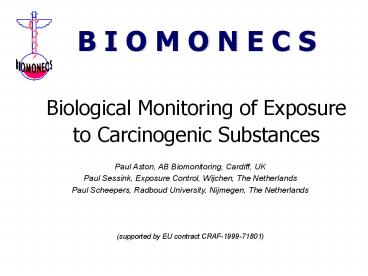Biological Monitoring of Exposure to Carcinogenic Substances
1 / 16
Title:
Biological Monitoring of Exposure to Carcinogenic Substances
Description:
Paul Sessink, Exposure Control, Wijchen, The Netherlands ... PAH 3-Hydroxybenzo[a]pyrene in urine. Propylene oxide Propylene oxide blood Hb adducts ... –
Number of Views:489
Avg rating:3.0/5.0
Title: Biological Monitoring of Exposure to Carcinogenic Substances
1
B I O M O N E C S
Biological Monitoring of Exposure to
Carcinogenic Substances
Paul Aston, AB Biomonitoring, Cardiff, UK Paul
Sessink, Exposure Control, Wijchen, The
Netherlands Paul Scheepers, Radboud University,
Nijmegen, The Netherlands (supported by EU
contract CRAF-1999-71801)
2
B I O M O N E C S
- The programme
- The consortium
- Achievements
- Future perspectives
3
B I O M O N E C S
Aim
To help make the biological monitoringof
carcinogenic substances more readily available
to a European-wideindustry
4
B I O M O N E C S
Programme structure
ResearchInstitutes
SMEs
5
B I O M O N E C S
The Consortium
University Institutes
European leaders in Biomonitoring
method development
SMEs Private labs
experienced in clinical/
environmental diagnostics and with
marketing resource
6
B I O M O N E C S
R D University Labs Radboud University
Nijmegen (NL) Co-ordinator of RTD Performers
University of Duisburg-Essen (D) University of
Stockholm (S) Frederic Alexander University of
Erlangen-Nürnberg (D) Université catholique,
Brussels (B) University of Copenhagen (DK)
SME Routine Labs AB Biomonitoring, Cardiff
(UK) Co-ordinator of the project Medizinisches
Labor Bremen (D) Laboratoriumsmedizin dr.
Eberhard Partners, Dortmund (D) Exposure Labo
Iliano, Destelbergen (B) Exposure Control,
Wijchen (NL)
7
B I O M O N E C S
Programme objectives
- Knowledge transfer from universities to SMEs
- Harmonisation of best practices
- Compare and improve analytical performance
- Discuss ethical implications of different
countries
- Establish a consortium of service providers
- Improve the cost-benefit ratio for end-users
8
B I O M O N E C S
Biomarkers of exposure
Scientifically established biomarkers were
selected for a range of chemicals where
therewas scope for analytical improvement.
The biomarkers were prioritised and classified
into 2 groups.
9
B I O M O N E C S
Class I biomarkers
Substance Biomarker Benzene
S-phenylmercapturic acid in
urine Benzene t,t-Muconic acid in
urine PAH 1-Hydroxypyrene in
urine Chromium VI Cr in erythrocytes
in blood Chromium Cr in
urine Cyclophosphamide Cyclophosphamide
in urine Arsenic Organic
and inorganic As in urine Cadmium
Cadmium in urine Nickel Nickel in
urine Diethylhexylphthalate
Monoethylhexylphthalate in urine
10
Class II biomarkers
Benzene BTX in alveolar air Diesel
exhaust Arylamine-Hb adducts in
blood Aniline Aniline and metabolites in
urine Benzidine Benzidine in
urine Beryllium Beryllium in urine Carbo- and
cisplatin Platinum in urine o-Toluidine o-Tolu
idine in urine Acrylamide Acrylamide blood Hb
adducts Chloroform Chloroform in alveolar
air Tetrachloroethylene Tetrachloroethylene in
alveolar air Trichloroethylene Trichloroethylene
in alveolar air Ethylene oxide Ethylene oxide
blood Hb adducts PAH 3-Hydroxybenzoapyrene
in urine Propylene oxide Propylene oxide blood
Hb adducts
11
B I O M O N E C S
RTD SME Collaboration
- SMEs
- Implementation of analytical methods for class I
biomarkers - Acquisition of parties interested in a
biomonitoring study - Negotiate study plan and costs for end-user
- Data collection, storage and shipment
- Perform analysis of biological samples
- RTD Support
- Implementation of class I biomarkers in SME
labs - Acquisition of parties interested in a
biomonitoring study - Preparation of study plan
- Trouble shooting during pilot studies
- Support interpretation of study outcome
12
B I O M O N E C S
Programme structure
ResearchInstitutes
SMEs
End - Users
13
B I O M O N E C S
Programme structure
Advisory Board
ResearchInstitutes
SMEs
End - Users
14
B I O M O N E C S
Internal Prof. Dr. Jürgen Angerer, toxicologist,
University of Erlangen-Nürnberg Dr. Lisbeth
Knudsen, epidemiologist, University of
Copenhagen Prof. Dr. Harry Roels, toxicologist,
Université catholique Brussels Dr. Margareta
Törnqvist, chemist, University of Stockholm
External Dr. Peter Boogaard, toxicologist, Shell,
The Hague Dr. Jan Dankers, chemist, Analytico,
Breda Dr. Nel Roeleveld, epidemiologist, Radboud
University Nijmegen Dr. Frits van Rooy,
occupational physician, Occupational Lung Centre,
Groesbeek
Midterm review (appointed by EC) Dr. Nico van
Sittert, former head of toxicology unit, Shell,
Amsterdam
15
B I O M O N E C S
Programme Activities
- Biomonitoring Protocols
- Biomarker background levels
- Biomonitoring Pilot studies
- Biomonitoring application data sheets
- Application of EQAS scheme
16
B I O M O N E C S
Future Perspectives
To build on the foundations which have been laid
to facilitate the appropriate use of
biologicalmonitoring in the European industry
WWW.BIOMONECS.com































